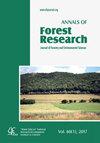红栎和椭圆栎叶形态和遗传变异:同域居群和异域居群的比较
IF 2.9
3区 农林科学
Q2 FORESTRY
引用次数: 2
摘要
栎树的种界往往不清晰,这可能是种间杂交、性状渐渗和表型可塑性的结果。黑栎(Quercus rubra L.)和椭圆栎(Quercus ellipsoidalis E.J. Hill)是两种对干旱具有不同适应能力的半同域干涉性红栎(Lobatae)。椭圆栎是北美红橡树中最耐旱的品种,其特点是根深,灌木状生长,叶深解剖。对于大多数分子标记来说,物种之间的遗传分化很低。然而,一个类似于constans (COL)基因的基因微卫星FIR013,先前被鉴定为在物种间强烈的分化选择下的异常位点。在本研究中,我们分析了邻近的(准柏属)紫荆(Q. rubra/Q.)叶片的形态计量特征。沿环境梯度分布于同一地区的一个同域种群中。利用叶片性状的多变量统计,两种植物在第一典型判别函数上均表现出明显的双峰频率分布,在表型极值上存在一定的重叠,特别是在同域居群中。同域居群和异域居群在叶片解剖性状上表现出强烈而一致的分化,而在更相似的环境条件下,同域居群在叶片大小上的分化较低。杂种和渐渗型的叶片表型显示母系效应和种间叶片性状的渐渗。栎树FIR013位点离群基因拷贝数与种群隶属度呈显著共线性关系,可以反映种群差异。对异常等位基因和叶片形状的类似环境选择压力也可能导致这种关联。在未来的研究中,可以使用分离的全同胞家庭来测试异常等位基因和相关基因组区域是否确实与叶片性状或其他物种区分性状相关。本文章由计算机程序翻译,如有差异,请以英文原文为准。
Leaf morphological and genetic variation between Quercus rubra and Quercus ellipsoidalis: comparison of sympatric and parapatric populations
Species boundaries in oaks are often not clear-cut, which is potentially a result of interspecific hybridization with trait introgression and phenotypic plasticity. Quercus rubra L. and Quercus ellipsoidalis E.J. Hill are two interfertile partially sympatric red oak species (section Lobatae) with different adaptations to drought. Quercus ellipsoidalis is the most drought tolerant of the North American red oak species and is characterized by deep tap roots, a shrubby growth and by deeply dissected leaves. Genetic differentiation between species is low for most molecular markers. However, one genic microsatellite in a CONSTANS-like (COL) gene, FIR013, was previously identified as outlier locus under strong divergent selection between species. In this study, we analyzed leaf morphometric traits in neighboring (parapatric) Q. rubra/Q. ellipsoidalis populations and in one sympatric population from the same region along an environmental gradient. Using multivariate statistics of leaf traits both species showed distinct bimodal frequency distributions for the first canonical discriminant function with some overlap in the phenotypic extremes, especially in the sympatric population. Leaf dissection traits showed strong and consistent differentiation between species in sympatric and parapatric populations, while differentiation for leaf size was lower in the sympatric population under more similar environmental conditions. Leaf phenotypes in F1 hybrids and introgressive forms suggested maternal effects and introgression of leaf traits between species. The association of outlier gene copy number at FIR013 with species-discriminating leaf traits in Quercus rubra can be a reflection of population differences since outlier gene copy number and population membership show significant collinearity. Similar environmental selection pressures on outlier alleles and leaf shape could also have resulted in this association. In future studies, segregating full-sib families could be used to test whether outlier alleles and associated genomic regions are indeed associated with leaf traits or other species-discriminating characters.
求助全文
通过发布文献求助,成功后即可免费获取论文全文。
去求助
来源期刊

Annals of Forest Research
FORESTRY-
CiteScore
2.20
自引率
11.10%
发文量
11
审稿时长
12 weeks
期刊介绍:
Annals of Forest Research is a semestrial open access journal, which publishes research articles, research notes and critical review papers, exclusively in English, on topics dealing with forestry and environmental sciences. The journal promotes high scientific level articles, by following international editorial conventions and by applying a peer-review selection process.
 求助内容:
求助内容: 应助结果提醒方式:
应助结果提醒方式:


